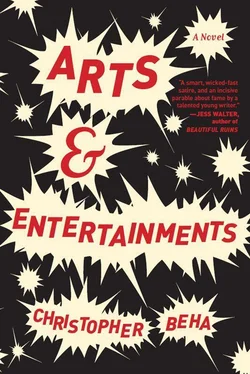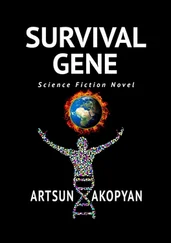“I’m not looking for a loan or anything.” This was true, but only because he had no means of paying one back.
“Of course not. I’m as broke as you are.” This might also have been true in some technology sense, though money was not something Blakeman had to worry about. “I’m just saying I think I can help.”
Eddie wanted to ask what kind of help he could offer, but Wilkins and Reilly descended on the table.
“We were just talking about those Melwood girls from our year,” Wilkins said. Melwood was the girls’ school around the corner from St. Albert’s.
“Do they still hang around the building after class?” Reilly asked Eddie. “With their uniform skirts rolled up?”
Eddie nodded while sipping his drink.
“Not a bad way to end the workday,” Wilkins said.
“They’re sixteen years old.”
“There’s no harm in looking,” Wilkins said. “That makes them as old as Justine Bliss, and look at the way she gets up on TV.”
As he spoke, he settled in across the table. The conversation about Blakeman’s help was over. But Eddie couldn’t stop thinking about it. After the four of them had closed the bar a few hours later, he walked home with a single phrase in his head: Blakeman can help. He dared to say it out loud. Blakeman can help. A couple walking by in the opposite direction — they weren’t much older than Eddie’s students — turned to look at him and laughed.
THE GALLERY WHERE SUSAN worked opened an hour after the start of the St. Albert’s school day, so Eddie usually beat his wife out the door. But she was already dressed to go when she woke him the morning after his reunion.
“Did you have fun?” she asked.
Eddie tried to piece together the later reaches of the previous evening, but the only fruit of this effort was a throb against the backs of his eyes. Had his brain been capable of generating a response, he would still have been unable to break his tongue sufficiently free from its surroundings to articulate it. He offered instead an affirmative cough.
“Was Blakeman there?”
Eddie remembered with some regret offering Susan as an excuse for his disappearance from Blakeman’s life. In fact, Susan liked Blakeman, and she didn’t understand why they saw so little of him. Eddie couldn’t tell either of them that Blakeman belonged to his old life with Martha.
“He invited me for dinner tonight,” Eddie managed after working his mouth into functioning order.
“That sounds nice. It would be good for you to get out a bit more. Maybe I’ll see if Annie wants to do something.”
Annie was Susan’s best friend from childhood. They’d moved together from Ohio to New York after college, and Annie had introduced Susan to Eddie, with whom she’d worked at St. Albert’s until leaving the year before, after the birth of her first child.
“See you this afternoon?” Eddie asked before Susan left.
Each year since their engagement she’d taken half a day off work to join him at graduation. She liked seeing the faces of the boys whose names she heard all year, chatting with the other teachers, feeling fully immersed in Eddie’s life.
“I’ll be there,” she said.
Eddie fell back to sleep after Susan left, and it was almost noon by the time he got across town to pack up his things at school for the summer. Rounding the corner, he saw Stephen McLaughlin sitting on a fire hydrant with his handmade sign propped up beside him. Eddie couldn’t read it from where he stood, but he knew exactly what it said. “Make St. Albert’s keep its word. Don’t evict a disabled man.”
Since its founding, St. Albert’s had occupied a mansion on Eighty-ninth Street between Madison and Fifth, donated by one of the rich Catholics who’d started the place, mostly third-and fourth-generation Irish who’d finally arrived in the higher reaches of society and wanted their own version of the private schools where rich Protestants sent their sons. The school had eventually expanded into an adjacent building, converting all the apartments into classrooms except the penthouse, where the young headmaster lived with his family. He’d stayed in the job for almost five decades. Shortly after his death, St. Albert’s went about taking possession of the apartment and found it still occupied by his fifty-year-old son. For three years now, Stephen and the school had been locked in litigation. For the last two, he’d camped outside the building every day, picketing while parents dropped off and picked up their sons. Despite the message on the sign, Stephen had no disability that Eddie could discern apart from a fairly encompassing pot habit. Since taking up his place outside the school, he’d grown out a thick red beard, as if to appear slightly menacing or to give off a hint of indigence — though he’d refused an offer of three-quarters of a million dollars to vacate the apartment.
“Handsome Eddie,” he said. “It’s been a slow day.”
Eddie’s mother had started working at St. Albert’s as Mr. McLaughlin’s secretary, and Stephen — then in his twenties and unemployed — often babysat the infant Eddie. Apart from Eddie’s parents, Stephen had known him longer than anyone alive.
“School’s out,” Eddie told him. “Graduation starts at the church in a few hours. You ought to set up shop over there.”
“Thanks, Handsome E.”
Stephen rose from the hydrant and picked up his sign while Eddie let himself into the building. He had a key to the rickety elevator, but he still thought of it as vaguely off limits to him, as it was to students, and he rarely used it. He walked up the back stairs to the faculty lounge on the second floor, which was already stripped almost bare. Most of the other teachers had cleared their things out the day before, while Eddie had been at his reunion. Eddie went through the papers in his small cubby with dutiful care before throwing the entire pile out. He left the lounge and walked up two more flights to the black box theater that held his drama classes.
Looking up at the stage, Eddie imagined himself playing Gayev in The Cherry Orchard or Eugene in Biloxi Blues. He didn’t usually get nostalgic at school. It was the place he worked every day, a fact that generally overwhelmed any memories of that earlier time. But the reunion had put those days in his mind, and with the building empty the weight of the present was not enough to suppress the past. The first time he’d been in that theater as an adult, he’d been shocked at how small it was, since it had seemed enormous when he’d performed there. He’d never felt nervous or excited before the performances, just enveloped in the thing he was doing. The curtain would go up, and for a few hours he felt more real than he did anywhere else.
Before acting, he’d never had something the other boys envied, as he envied their wealth and their easy sense of entitlement. His first years at St. Albert’s had not been particularly happy ones, and his unhappiness was made worse by the fact that he could never criticize the place at home. His education had been his parents’ second great gift to him, after their prenatal move to America. They’d held out great hopes for the transformative possibility of Eddie’s mere presence at a school that had educated the sons of mayors, governors, senators, and one president. At home, they spoke of the place in the respectful tones they usually reserved for Cardinal O’Connor or the Clancy Brothers. When a St. Albert’s graduate strangled his girlfriend with her bra in Central Park during Eddie’s childhood, even this incident brought an odd credit to the place, since the pages of Newsday and the Post insistently contrasted the Preppy Murderer’s lurid crime with his refined pedigree. When a parochial school kid killed his date, it didn’t make the front page.
Читать дальше












